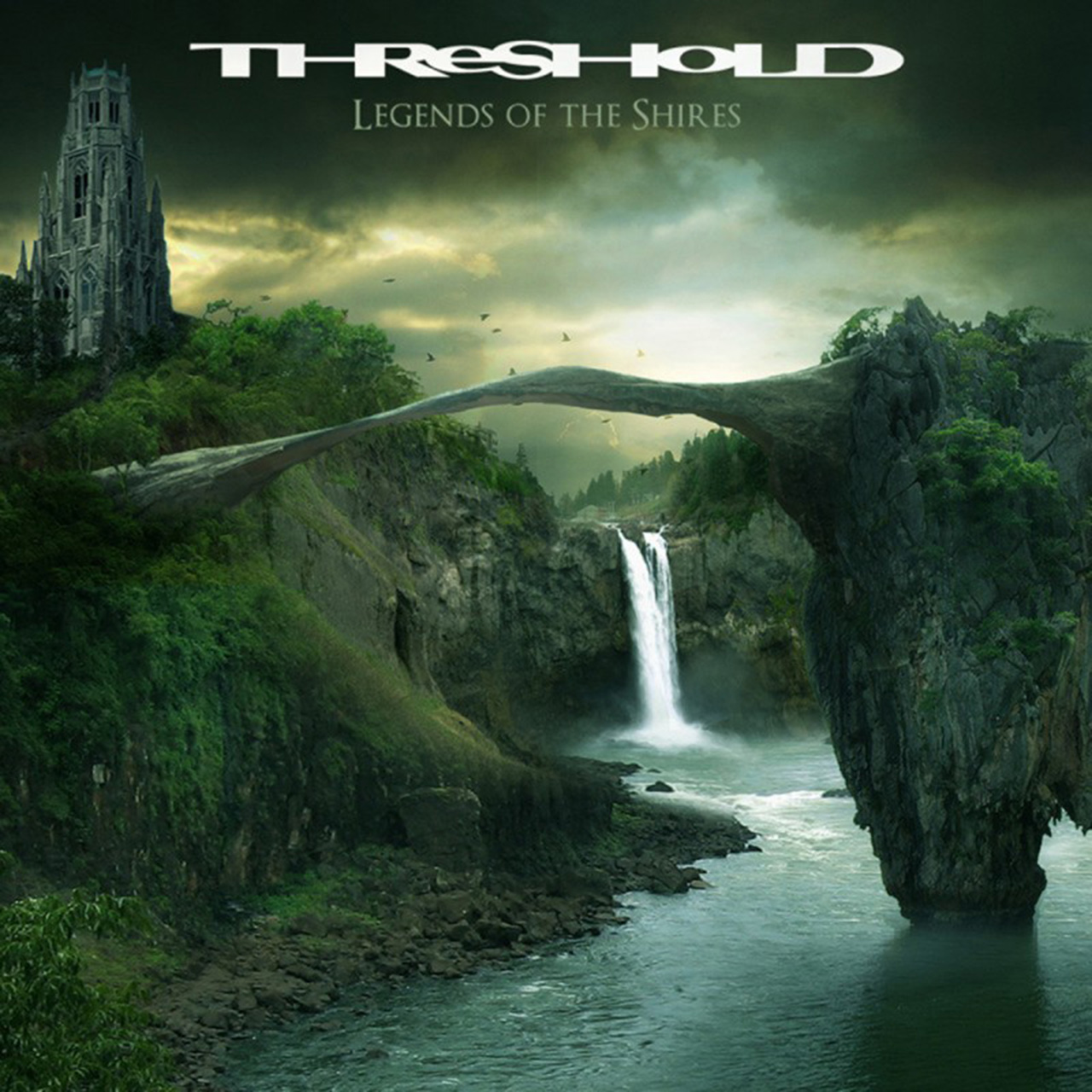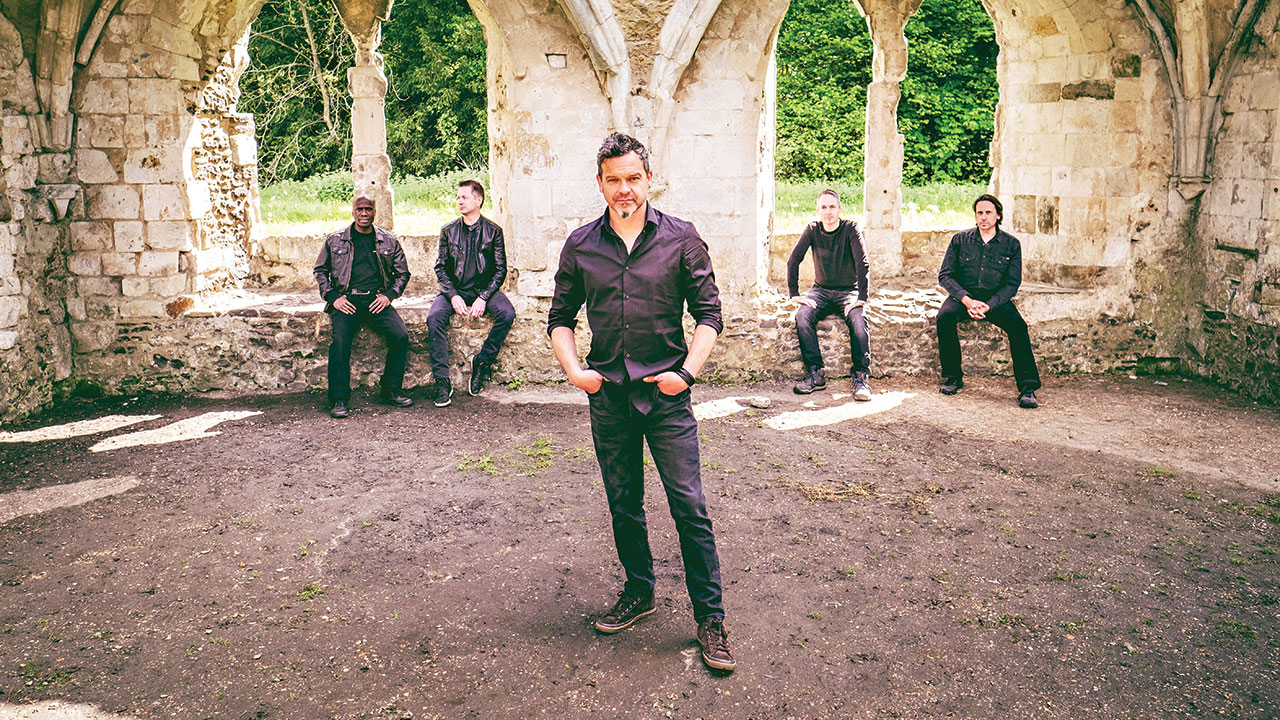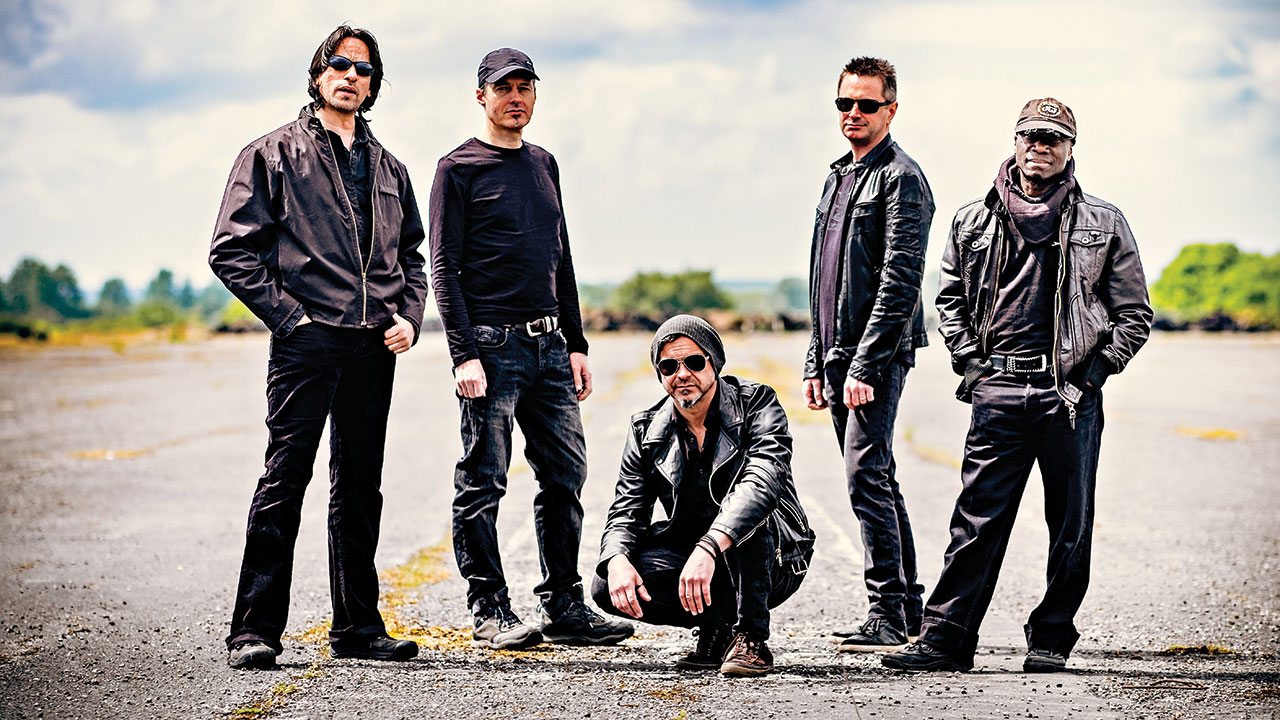Sometimes you have to take a step backwards before you can move forwards. It’s been a time of change within the ranks of Threshold. Guitarist Pete Morten left the fold in February, then vocalist Damian Wilson was released from his duties in March. Glynn Morgan, who last sang with Threshold in 1996, is back as the band release their 11th studio recording, the massive – in every sense – double concept album Legends Of The Shires.
“We’d rather not dredge that up,” says keyboard player Richard West when Prog broaches the prickly subject of the recent departures. “With no disrespect to the last line‑up, sometimes change is good and it shakes things up a little bit. Certain areas were getting a bit stale and a bit awkward in the band and it’s an opportunity to have a new beginning and move on. At the moment, we feel like we’re in a good place, everyone’s happy, we love what we’ve done, can’t wait to get out there to play it.”
Morgan might have waited two decades to return to Threshold, but he had no doubts about rejoining the band when the call came.
“When you get a job opportunity like this, how can you turn it down?” says the singer. “I was thrilled and then even more so when I heard the material because I think it’s a great album. It’s well-written, great lyrics, the sound harks back to the earlier albums. I can only bring to the table my voice, what I do, how I sing. Hopefully I can be the personality that I am when we play live.”
Morgan describes himself as a big fan of his predecessor’s voice, while West is quick to point out that there wasn’t some dramatic clash that precipitated Wilson’s exit.
“I’ve always been good friends with Damian but I don’t think our paths have always been aligned,” he says. “Different people have different ambitions, different goals, and they don’t always line up. When that happens, you either decide to force it together or you just let people go the way they want to go.”

When Morgan stepped back into the picture, the writing process was already complete for Legends Of The Shires. “I got the demos and they blew me away,” says the singer. “There was nothing to be added. Richard said, ‘All the songs are written, there’s no chance to write anything on this album,’ and when I heard it, I just thought to myself, ‘Of all the Threshold albums, this is the one I would have wanted to sing.’ Fantastic.”
As the main lyricist, West has had to learn how to write and arrange for different voices, starting with Andrew ‘Mac’ McDermott, then Damian Wilson, and now Glynn Morgan.
“I did five records with Mac and every record I was trying to learn more and more about his voice so I’d know exactly what he was going to sound like, whatever I wrote,” says West. “I got to know his voice inside out. I loved that, getting to know somebody in that way and being able to write for them and hearing it work. For Damian, it was slightly different. His voice changed over the years a little, we only did the two records together so I never quite got that same connection with him. With this album, I was just writing melodies I loved and trying to write songs that made me excited so they were always going to work for anybody, as long as they could hit the high notes and reach the low notes.”
“He seems to bring out the best in vocalists,” says Morgan about working with West, who produced Legends Of The Shires with guitarist Karl Groom. “He finds a way to push you to the limit – the safe limit. I remember when we recorded Under The Sun [from 1994’s Psychedelicatessen], Richard’s on the piano trying to find the right key. He just keeps going up, up, up, to the point where I’m thinking, ‘Are you joking?’ But Under The Sun turned out to be one of the standout vocal pieces that I’ve ever recorded, even though it’s not exactly a rock song, is it?
“With this stuff now, it just seemed to work again,” he adds. “It’s a strange feeling – even though we’ve all got older, it was so familiar again.”
The decision to make Legends… a double album grew from a desire to consciously reconnect with the group’s progressive instincts after shifting away from those on 2014’s For The Journey.
“We were looking back at records like Subsurface, thinking, ‘There’s a bit more breathing room on some of the songs,’” says West. “We thought, ‘Let’s really unleash our prog wings,’ and from that moment, the songs started flowing. Before we knew it, we had more than enough for a single album.
“If it’s going to be prog and a concept album, let’s make it double as well. We’re ticking every box. I think we could have made it even longer but then it wouldn’t have fitted on four sides of vinyl.”

As a title, Legends Of The Shires hints towards a certain Tolkien-esque vibe, but West quickly shoots down that notion. “We never wanted it to be about hobbits,” he says emphatically.
Instead, the title reflects the belief that one of the qualities separating Threshold from their German labelmates on Nuclear Blast is the fact that the band are English.
“Shire is very much an English word,” says West. “All the old counties of England, we’re the shires, so we wanted to make it a collection of stories from, or about, the regions, and how they interact. That’s how the theme came to be. ‘Region’ is a pretty dull word – Reports From The Regions just doesn’t work. Legends Of The Shires sounded like a great British prog album to me, and that’s what we wanted to make.”
Committing to the concept for Legends… meant that every tune had to connect to the central theme, so some songs had to be put in the vaults for another occasion.
“Our drummer [Johanne James] had a song that was a totally different subject so we had to politely decline his offer,” says West. “Steve [Anderson], our bass player, wrote the track On The Edge and it was a little bit different when he presented it, so we said, ‘If it’s going to be part of this story, can we make a few changes here and there?’ We did chop it up a bit and I hope he’s forgiven us. That’s where the compromises come in. But it’s not like we’re telling a very precise narrative – it’s more snapshots, like scenes of a story, all the way through. It’s fairly loose, and intentionally so because you don’t want a story that you hear once and then you know it. You want open themes that people can put themselves in, identify with and put their own meaning into.”
The band will perform a selection of songs from Legends… on their upcoming tour, although West is clearly tempted by the idea of tackling the entire album live at some point in the future. “It’s crying out to be done,” he says. “Whether or not it will happen I don’t know, but it would be fun.”
The winter tour sees Threshold playing a series of shows in Germany, but only making two UK appearances – first at HRH Prog in November, followed by a single London headline show in December. West says the band have always found central Europe to be a much more fertile ground.
“I think maybe what happened with Britain is that prog and metal were very much 70s into a bit of the 80s, and then we went somewhere else. We went into dance, we went into Britpop, and we left behind the old stuff. Generally, Germany didn’t leave behind the old stuff – they still carried on listening to it, so that’s our market.”
Whatever the state of the UK’s live prog circuit, at least the band have long since left behind the days of touring in a van, now enjoying the relative luxury of travelling in a Nightliner bus.
“It’s great and I love it,” says West, “but I remember I sent my wife a photo from the last tour, saying, ‘Here’s my bunk,’ just to show her where I was, and she just wrote back, ‘You look like you’re living in a homeless shelter, mate. What are you doing this for?’
“I’ve got to say, it was more comfortable when I was in my 20s. It’s a bit of a small, tight, narrow, coffin-like slab where it’s either too hot or too cold and you’ve got the bumping up and down of the bus and 10 guys around you snoring, so it’s not necessarily as glamorous as we thought it used to be, but it’s still a great way to tour.”
And the venues have changed too. “It’s not like the 90s where you’d go to Europe and you didn’t know what you were going to get,” says West. “We played one venue with no stage – that was in the former East Germany back in the 90s. It was a small village, and halfway through one of the songs, some guy walked up to our drummer with a CD and a pen saying, ‘Can you sign this?’ He’s playing! He can’t stop playing right now!”
As Threshold enter the next stage of their three-decade career, West has only optimism for the future.
“We spent 10 years with the last line-up. We became this family. But now we’ve changed. It’s not the first line-up change and it probably won’t be the last, but musically we always carry on. And musically we’re celebrating the old and the new, the prog and the metal in one go, so it feels like everything of Threshold all-in-one.”
This article originally appeared in issue 80 of Prog Magazine.

